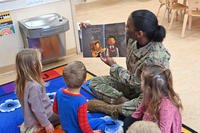The Leidholms are just like any ordinary young family. They get up early each day to deal with the happy chaos of getting themselves ready for work and preparing their two small daughters for the day.
Dad and mom tag-team -- he changes the baby's diaper, makes sure the three-and-a-half-year-old is dressed and clean, then feeds the cats and dogs. He heads out the door by 6:30 a.m.
Mom spends a few more moments nursing the eight-month-old. Then, she too leaves to drop the kids off at daycare and get to the office.
Nights and weekends are spent doing the usual stuff: housework, homework, laundry, running errands, watching television and, of course, sharing time with each other.
They are a typical American family, except for one significant difference: Staff Sgt. Kyle Leidholm, 60th Maintenance Squadron, and Staff Sgt. Nicole Leidholm, 60th Air Mobility Wing Public Affairs, both serve their country in the Air Force at Travis Air Force Base, California, as a dual-military couple.
Unlike most families, they know the normal routine could be dramatically interrupted at any time.
Currently, the Leidholms work a fairly normal duty day. Kyle is an aero repair technician, servicing heavy-lift transport aircraft at Travis. Nicole is a photojournalist and the noncommissioned officer in charge of media relations.
They are aware that, with the current state of world affairs, one or both of them could be deployed overseas with little notice. Like all military personnel, they are ready to put the needs of their country above all else.
Dual-military couple marriages -- an active-duty member married to another active-duty member or to a member of the National Guard -- are becoming more common, with the highest percentage of these couples being in the Air Force, according to a 2008 Department of Defense study on military families.
Both Kyle and Nicole joined the military when college plans didn't work out. Nicole was still in technical school when the two married. Kyle was stationed at Travis, and Nicole joined him soon after. The girls were quickly added to their growing family.
The military treats each member of a dual-military couple as an independent entity, despite the fact that the couple makes decisions jointly. Unfortunately, this can be problematic at times.
"Work is definitely a lot harder than it was before kids," said Kyle. "Working extended shifts and night shifts is harder. The balance of family and job tend to blur."
"When I went on a temporary-duty assignment before we had kids, I didn't have to worry if Kyle was going to be able to get off work on time to pick up the kids," said Nicole. "It's harder trying to explain to my oldest why Dad hasn't come home from work yet, or why Dad is going to work at night -- 'to put the airplanes to sleep.' "
"She's very curious and notices everything," she added. "When he was on 12-hour days, I was the one coming home after work and cooking dinner and getting her ready for bed on top of when I was pregnant. It's definitely an added challenge to balance life and work duties."
Often, there can be difficulty fitting child care expenses into a military budget.
"The cost of child care is not cheap," said Nicole. "We use family child care so our costs are a bit more than at the Child Development Center on base, but I like it. There's usually a smaller number of children, and they take care of my girls like their own."
"On top of those costs, infant care is even more," she continued. "So having two kids in child care was almost like sticker shock when I first went back to work after maternity leave. Fortunately, we both received promotions around that same time, so our 'extra money' goes toward the cost of childcare. The child care expenses a little more than doubled for each week with the new baby."
Since Sept. 11, 2001, deployments are the rule, not the exception, for military families. Research from a 2009 RAND National Defense Research Institute study shows these deployments often have a more negative effect on dual-military member retention and family life than on non-dual military couples.
Kyle shared an experience he had when his wife was deployed.
"I had appliances die on me during a base exercise, and I had to figure out child care by myself without help from my spouse on the other side of the world," he said. "Just the day-to-day Air Force obligations affected both me and my wife and, sometimes, it carried over to the kids."
"Our first deployments didn't really have an impact on our oldest daughter," said Nicole. "She was too young to remember. The deployments were harder on us. I deployed first in 2014 to Southwest Asia, and it was a lot harder on my husband because he, all of a sudden, was a single dad."
"I also do all the finances so some of that stuff I had to keep on him to pay the bills," said Nicole. "At the time, he worked in a shop that did eight-hour days but, more often than not, those days became 12-hour days -- no notice. They also worked a Panama schedule but, because I was deployed, they worked his schedule to be Monday through Friday. Thankfully, we also had a flexible child care provider that could help us out."
A Panama shift is 24/7 coverage with four teams working two 12-hour shifts on a rotating pattern -- two days on, two days off; three days on, three days off; two days on, three days off.
Child care most notably affects the retention rate of dual-military couples. Although the RAND NDRI study shows both male and female service members perform at the same levels on the job, women are more likely to cite family responsibilities when they leave the service. Male service members are more likely to cite financial concerns or career opportunities.
"I'll play it enlistment by enlistment," said Kyle. "I would like to retire out of the military, but we will see how the next 14 years go."
Having supportive leadership and an understanding and flexible work environment are vital to alleviate the stressors of a dual-military family.
"It's the only thing that can make it so I can continue to serve and still be there for my kids and wife," said Kyle.
"It's extremely important," said Nicole. "Recently, when I was on a trip, I was supposed to be back after four days and ended up being away for seven. My leadership asked to make sure Kyle was OK and if he needed anything. It's good to know if there was anything needed, they were there for us. It's hard to focus on the mission if my family isn't cared for when I'm away."
Today's technology makes it easier to keep in touch while being deployed for any length of time, and lessens the anxiety of separation. Nicole's first deployment was for six months.
"We were only three years into our marriage -- young by any standard. So it definitely put a strain on our marriage," she said. "Skype was a big one when I was deployed, but now -- and even when I was TDY -- we used Facebook messenger to video chat. We also used a free texting app when I was deployed. I've now learned that my phone carrier has an overseas plan that I would look into using the next time either of us deployed. We also sent a lot of care packages."
When you've got kids at home, being away is never easy. It's always hard to say goodbye. Kids grow and change fast, and half of a year is a long time.
Having a family care plan is a mandatory military requirement to protect children of military families when the worst-case scenario happens and parents must answer the call to duty.
"Dual- and single military families can face some unique challenges," said Master Sgt. Hugh Fetla, 60th Comptroller Squadron first sergeant.
Fetla served as first sergeant to both of the Leidholms, who are in different squadrons.
"Deployments and unaccompanied assignments can make child care and maintaining the marriage very difficult," said Fetla. "Mission permitting, the member's leadership can work with the dual- and single military families when assigning deployment cycles and work schedules. But sometimes, the mission does not allow leadership to be 100 percent accommodating. When this happens, one of the most important items the dual- and single military families need to have is a family care plan (FCP). This will ensure the children are taken care of during a medical emergency or period of separation."
"I think Kyle has had to use it; I've almost had to," said Nicole. "Every year, his unit recertifies the FCP. We also have to keep it updated, such as when our provider moved, we changed providers and when we had our second daughter."
With time in service, promotions and the gained experience of military life, there is an increased understanding and acceptance.
"I can see the bigger picture of what the mission needs," said Kyle. "It makes it easier to get on board with the decisions leadership makes. I wish it had been relayed to me differently when I was a younger airman with kids."
Nicole agreed.
"We have a lot more responsibilities now as noncommissioned officers than as airmen. Now we are taking care of people at work and at home. I guess in a way, for me, becoming a mom first helped prepare me to be a leader."
Though the demands of dual-military couples can be problematic, Kyle and Nicole's unwavering commitment to each other and to their children make it possible to readily face any challenge.
"Having us both in is cool because we understand the job that each of us does. Sometimes, spouses don't know what their significant other does every day at work," said Nicole. "It also made the deployments easier in my mind because we knew the locations and our resources."
"It's also cool because we can talk military jargon with each other and have an understanding of some of the stressors that may be going on," she said. "At the supervisory level, we can bounce ideas off each other and learn together. It's also neat to almost get an inside seat to see how another squadron operates. Kyle is also a key spouse and can share his insight of not only being a spouse, but also being in the military."
"She makes me think bigger than maintenance when I talk to her about my troops and how to help them," said Kyle. "She always has that important phone number when I don't know who to call."
Nicole is very proud of her daughters, especially her eldest, who at only three years of age has seen one or the other parent go through two six-month deployments and three TDYs.
"It's amazing how resilient kids are," she said.
Keep Up with the Ins and Outs of Military Life
For the latest military news and tips on military family benefits and more, subscribe to Military.com and have the information you need delivered directly to your inbox.





















